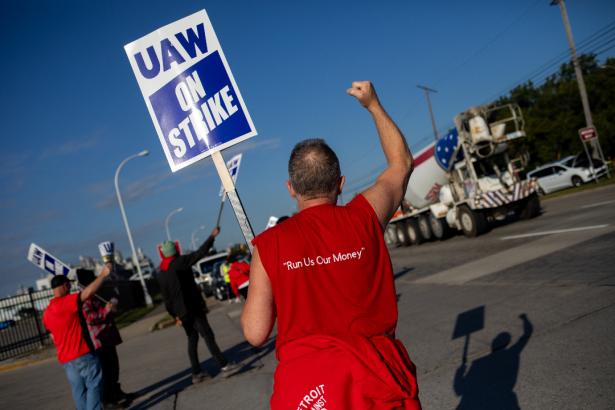This week, in Spring Hill, Tennessee, just south of Nashville, roughly one thousand workers at Ultium Cells LLC, an electric vehicle (EV) plant jointly run by General Motors and LG Energy Solution of Korea, joined the United Auto Workers (UAW) after a majority of the venture’s employees signed union-authorization cards. The advance is a product of the pathway to unionization won by the UAW during its historic strike against the Big Three automakers — GM, Ford, and Stellantis — last fall.
The pathway to unionization won in that fight allows EV workers to organize via what’s known as “card check,” rather than having to file for anNational Labor Relations Board (NLRB) election, with all the opportunities for union busting that accompanies that latter process. In his presidential campaign, Barack Obama promised to pass the Employee Free Choice Act (EFCA), a federal law that would grant workers across the country the ability to unionize via card check. He reneged on that agreement, though calls for EFCA’s passage are now emerging in light of the obstacles facing current unionization drives at the likes of Starbucks. Without such a law, the process must be won through workers’ struggle, as the striking UAW members won it for Big Three EV workers.
The Ultium unionization marks the second recent win for Tennessee’s autoworkers. In April of this year, some 4,300 workers at Volkswagen in Chattanooga — the site of several prior unsuccessful UAW campaigns — became the first Southern autoworkers outside of the Big Three to win a union. It was the first victory in the union’s ambitious plan to organize some 150,000 non-union autoworkers across the country, on which it is spending $40 million. The month following the win in Chattanooga, the union lost an NLRB vote by Mercedes-Benz workers in Vance, Alabama, where a union-busting campaign led to unfair labor practice charges in the United States as well as an investigation in Germany.
According to the UAW’s national contract, starting pay at Ultium’s Spring Hill plant, which was $20 per hour, will rise to a minimum of $27.72, with minimum production-worker pay rising to $30.88 over three years. That amounts to a roughly 35 percent raise.
“You’re grouped together, and you can stand up as one,” Ultium worker Jim Erwin said of the decision to organize. “Instead of just one stick, you’ve got several. You can’t snap several sticks, but you can snap one.”
SHARE THIS ARTICLE
CONTRIBUTORS
Alex N. Press is a staff writer at Jacobin who covers labor organizing.
“Town & Country,” our focusing on rural politics, is out now. Subscribe to our print edition today.


Spread the word